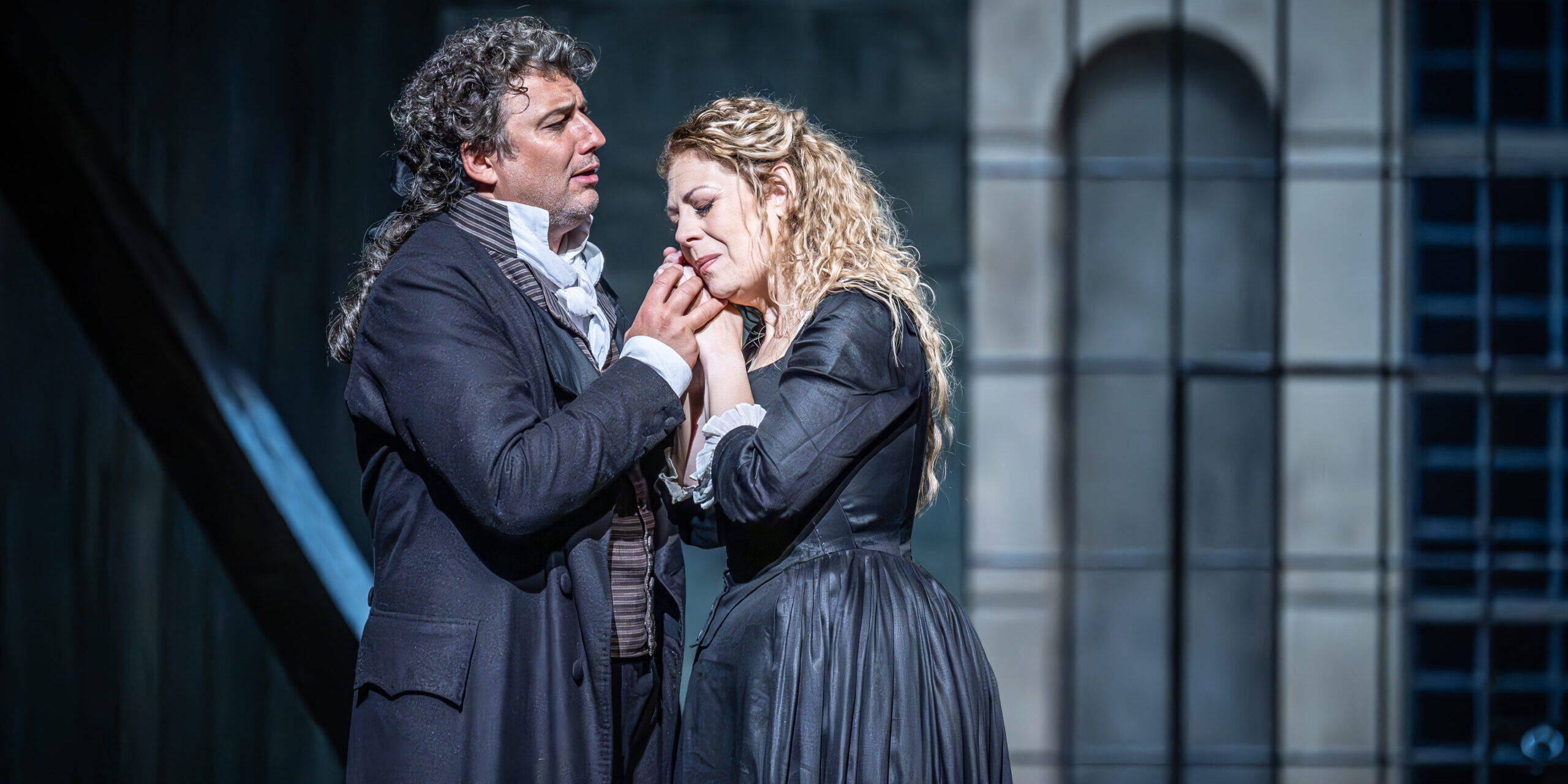Following the wonderful Gala evening barely two weeks ago to celebrate 22 years at the helm of ROH (longer than any of his predecessors), Antonio Pappano chose David McVicar’s 10-year-old production of Andrea Chénier to say his final goodbye. What a spectacular goodbye – a jewel in Pappano’s crown.
Umberto Giordano used the true story of the poet Andrea Chénier, guillotined in 1794 aged 32, three days before the end of the Terror as inspiration for this verismo opera. Pappano waves his magic baton and transforms it to a thing of greatness. The orchestra and chorus excel themselves for him. The cast is top notch. Terrific costumes and sets pay attention to historical detail, including Robespierre in a period wheelchair.
The story, set in the French Revolution, is of Gérard, a servant in the de Coigny household. He has loved the daughter, Maddalena, since they were children despite the class difference. Andrea Chénier joins the gathering. He entrances Maddalena. The revolutionaries are heard outside, Gérard lets them in to the shock of the aristos, joining them, becoming a revolutionary leader. Five years later, Maddalena and Chénier fall in love. Through plot twists including an almost Scarpia/Tosca choice for Maddalena to save Chénier, they die together on the guillotine. The curtain is a bloodstained tricolor saying – ‘Même Platon a bani les poètes de la République (Even Plato banished poets) – Robespierre.’
This is known as a tenor’s opera, sung by all the greats, including Gigli and Caruso. German tenor Jonas Kauffman was fabulous in 2015, and we all wondered, how would he be singing? He has suffered terribly with three bouts of Covid and other problems. He has been forced to cancel many performances. Even in the Gala two weeks ago he sounded strained singing carefully in the big Forza duet.
What most do not expect, unless you heard him at the Gala, was for 2019 Cardiff Prize-winner, Mongolian baritone Amartuvshin Enkhbat as Gérard to steal the show. His packed diary includes La Scala and the Met. He has a sensational big, dark and powerful voice with a quality I have not heard since the late great Dmitry Hvorostovsky. He is if not the best, one of the best baritones singing today. He can be heard easily over full orchestra. There has been a gap in top baritones to sing the big Verdi roles which suit his voice perfectly. His Italian is excellent. Gérard starts the music with his aria – ‘compiacente a’ colloqui’, building intensity to the powerful ending’ É giunta l’ora della morte’ – his chilling foreboding of the future. He slinks into servant anonymity at the side of the stage as the music switches to the trivial aristos. Motionless for 30 minutes, a real feat, he discards his livery to join the revolutionaries. ‘Nemico della Patria’ in Act 3 is a tour de force. You will not hear it better sung.
We need not have worried about Jonas. Apart from looking every inch the tortured poet, his first aria ‘un dì all’azzurro spazio’ is fabulous. His diminuendo on ‘firmamento’ followed by letting everything out with passion on ‘t’amo’ is stunning. He voice does not ping as it used to, and sounds a trifle tarnished, but he is back! ‘Come un bel dí di Maggio’ is exquisite.
Canadian soprano Sondra Radvanovsky’s Maddalena is fantastic. Anyone who saw her unforgettable Medée from the Met slithering snake-like on the floor will understand her intense commitment. She acts youthful, singing phrases with the most delicate diminuendo pianissimi, turning on the power at will. Her big voice can be heard at the back of the amphitheatre. She can drain her voice of all colour, and still be heard. ‘La mamma é morta’ is fabulous. Intense, lyrical, passionate, she gives everything.
Importantly, Kaufmann and Radvanovsky have a marvellously intense and credible chemistry.
French mezzo Katia Ledoux as Bersi has a terrific voice, but her intonation drops on the loud passages, which tend to be flat.
75-year-old English soprano-turned-mezzo Rosalind Plowright as Comtesse de Coigny is amazing.
83-year-old Italian mezzo Elena Zilio as Madelon is sensational.
This is the end of an era. Tickets are sold out or expensive. This is a terrific show, with three superstars and one astonishing conductor. Not to be missed. Go to the cinema on 11th June to see Pappano wave his final goodbye.
Dramma Istorico in Four Acts
Royal Opera House, Covent Garden
Music by Umberto Giordano
Libretto by Luigi Illica
Conducted by Antonio Pappano
Directed by David McVicar
First performance 28th March 1896 Teatro alla Scala, Milan
Photo Credit Marc Brenner
Cast includes Amartuvshin Enkhbat, Sondra Radanovsky, Jonas Kaufmann, Katia Ledoux, Elena Zilio, Aled Hall, James Cleverton, William Dazely
Running time 2 hours 40 minutes with one interval
30th May 2024 Performances until 11th June 2024
Live in cinemas 11th June.

